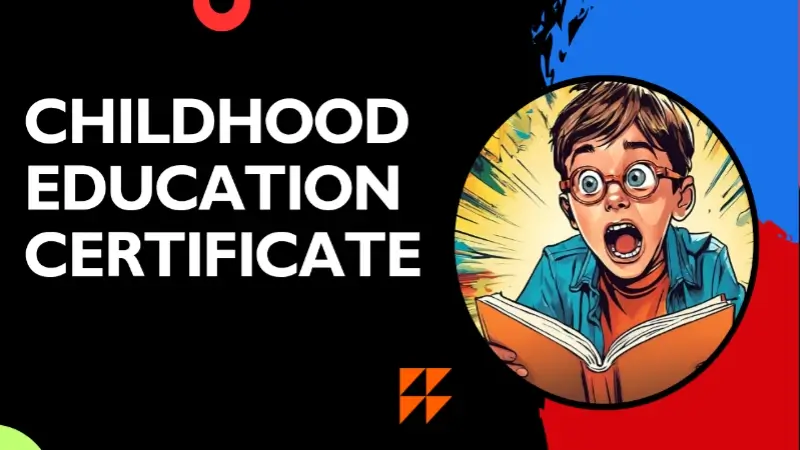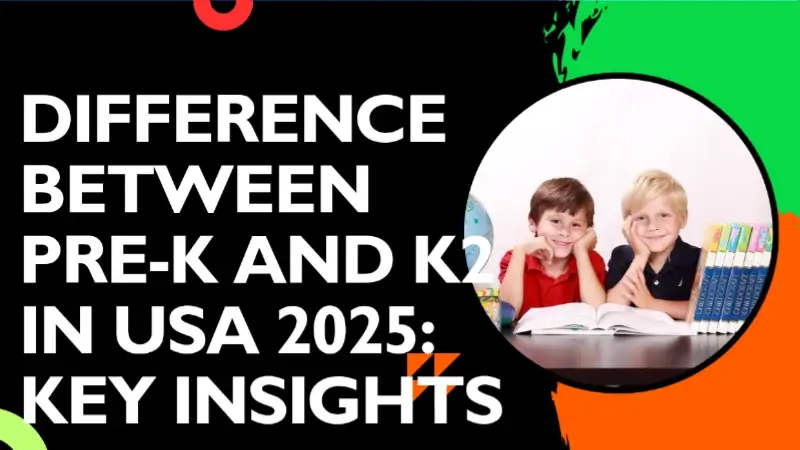Get Your Early Childhood Education Certificate
Childhood Education Certificate: Get Your Early
In this article Learn what an early childhood education certificate is, benefits, requirements, jobs, and how to get certified to work with young children. Start making a difference today.
Unlock Your Career with an Early Childhood Education Certificate
Have you ever felt a pull towards working with young children? Maybe you’ve spent time with toddlers or preschoolers and felt a genuine connection, recognizing the incredible potential within those formative years. If the idea of nurturing young minds, shaping their first learning experiences, and contributing to their healthy development excites you, then pursuing a career in early childhood education (ECE) might be your calling.
A key first step for many looking to enter this fulfilling field is earning an early childhood education certificate.
This certificate is more than just a piece of paper; it’s your entry point into a world where you can make a real, lasting impact on children’s lives during their most crucial developmental period. But maybe you’re wondering: What exactly is an early childhood education certificate?
What can you do with it? How do you get one? And is it truly the right path for you? We’re here to help answer those questions and guide you through understanding the value and process of obtaining your early childhood education certificate.

Understanding the Value of an ECE Certificate
An early childhood education certificate provides foundational knowledge and practical skills essential for working with infants, toddlers, and preschool-aged children. It’s designed for individuals passionate about early learning but who may not yet have a college degree in the field. Earning this certificate offers several significant benefits.
A Foundation for Your Career
For many, an early childhood education certificate serves as an accessible starting point for a career working directly with young children. It equips you with the basic understanding of child development, safety protocols, and age-appropriate activities needed for entry-level positions in various early care settings. It’s often the quickest way to transition into a professional role if you’re changing careers or just starting out.
Building Core Competencies
ECE certificate programs focus on core skills crucial for effective interaction and care of young children. You’ll learn about typical developmental milestones, how to create safe and stimulating learning environments, basic child psychology, and effective communication strategies for interacting with children, parents, and colleagues. These competencies are not just theoretical; they are directly applicable to daily work in a classroom or care setting.
Meeting Professional Standards
In many states across the U.S., holding an early childhood education certificate (or a similar credential) is a minimum requirement for certain positions in licensed childcare centers, preschools, or Head Start programs. Employers look for candidates who have demonstrated a commitment to the field and possess recognized training. Earning the certificate shows potential employers that you have met a certain standard of knowledge and preparedness.
The Impact on Child Development
Perhaps the most rewarding aspect is the direct impact you can have. Armed with the knowledge from your early childhood education certificate program, you’ll be better equipped to foster a positive and supportive environment that promotes cognitive, social, emotional, and physical development in young children.
You’ll learn how to implement activities that encourage curiosity, problem-solving, language development, and positive peer interactions during a period when a child’s brain is developing rapidly. High-quality early childhood education has been shown to have lasting positive effects on academic achievement and social skills.
Research from organizations like the National Association for the Education of Young Children (NAEYC) consistently highlights the critical role of well-trained educators in achieving these outcomes.
Learn more about the importance of early childhood education from NAEYC Resources.
Your Pathway to an Early Childhood Education Certificate
Getting your early childhood education certificate involves several steps, but it’s a clear path once you understand the process.
Choosing the Right Program
ECE certificate programs are offered by various institutions, including community colleges, technical schools, and sometimes online educational providers. When choosing a program, consider factors like:
* Accreditation: Verify that both the institution and its program are officially recognized by an accredited agency. This affects the transferability of credits and the program’s credibility with employers.
* Curriculum: Does the program cover the topics you’re most interested in or that are required for the types of jobs you want?
* Program Length: Certificates can vary in length, often ranging from a few months to about a year, depending on whether you attend full-time or part-time.
* Cost: Compare tuition and fees across different institutions.
* Location/Format: Decide if you prefer in-person classes, an online format, or a hybrid model.
Admission Requirements and Process
Admission requirements for an early childhood education certificate program are generally less stringent than for degree programs. Typically, you will need:
* A high school diploma or GED.
* To complete an application form.
* Sometimes, placement tests in reading or math.
* Background checks are usually required before starting any practical experience (like a practicum or internship) and are standard for employment in this field.
The application process usually involves submitting transcripts and completing the necessary paperwork.
Exploring Coursework
The specific courses will vary by program, but most early childhood education certificate curricula cover foundational topics essential for working with young children. Common subjects you’ll likely encounter include:
* Child Growth and Development: Understanding the physical, cognitive, social, and emotional stages from infancy through age eight.
* Principles of Early Childhood Education: Learning about various educational philosophies and best practices for teaching young children.
* Health, Safety, and Nutrition: Crucial knowledge for ensuring the well-being of children in your care.
* Curriculum Development: How to plan age-appropriate activities and learning experiences.
* Child, Family, and Community Relationships: Building partnerships with parents and understanding the community’s role.
* Guidance and Classroom Management: Positive strategies for managing children’s behavior.
* Observation and Assessment: Learning how to observe children’s progress and needs.
Typical Course Categories
* Child Development Basics
* ECE Methods and Curriculum
* Health and Safety Standards
* Professionalism and Ethics in ECE
Gaining Hands-On Experience
Many high-quality early childhood education certificate programs include a practicum or internship component. This is a supervised period where you get hands-on experience working directly with children in a real early childhood setting, such as a childcare center or preschool.
This practical experience is invaluable for applying what you’ve learned in the classroom and building confidence. Additionally, it offers professional networking avenues and the opportunity to secure valuable references for future job pursuits.
Online vs. Campus-Based Learning
Choosing between an online or traditional campus-based program for your early childhood education certificate depends on your lifestyle and learning preferences.
* Campus-Based: Offers face-to-face interaction with instructors and peers, structured class times, and direct access to campus resources.
* Online: Provides flexibility, allowing you to study on your own schedule, which is ideal if you’re working or have other commitments. Ensure the online program is reputable and includes provisions for supervised practical experience near your location.
Navigating Program Choices
Selecting the right early childhood education certificate program involves more than just finding one with convenient classes. It’s also about understanding the nuances of the programs available and how they align with your career aspirations.
Different Specializations
Some certificates may offer a general focus, while others allow you to specialize. For instance, you might find programs specifically designed for working with:
Infant and Toddler Care
Focuses on the unique needs and developmental stages of very young children, including feeding, diapering, and early sensory exploration.
Preschool Education
Concentrates on preparing children aged 3-5 for kindergarten, focusing on pre-literacy, pre-math, social skills, and play-based learning.
Children with Special Needs
Provides foundational knowledge for supporting young children with diverse learning needs and disabilities within an inclusive setting.
Certificate Length and Intensity
The time it takes to complete an early childhood education certificate can vary. Shorter programs might focus intensely on core competencies and can be completed in less than a year, especially with full-time study. Longer programs might offer more in-depth coursework or extended practical experience. Consider your availability and how quickly you need to enter the workforce when evaluating program duration.
Program Outcomes and Career Goals Alignment
When reviewing programs, look at their stated outcomes. Do they prepare you for the specific roles you are interested in? Do they have connections with local childcare centers or preschools for practicum placements?
– State-Specific Requirements
It’s crucial to research the licensing and certification requirements for early childhood educators in the specific state where you plan to work. Requirements can vary significantly. While a general early childhood education certificate provides a strong foundation, some states may have additional mandates or preferred credentials. For example, some states might require specific coursework hours in certain subjects or a particular number of hours of supervised experience.
Explore a sample of state requirements, like those for California Childcare Licensing.
– Understanding Articulation Agreements
If you think you might pursue a higher degree (like an Associate’s or Bachelor’s) in the future, check if the certificate program has articulation agreements with colleges or universities. This means the credits you earn in the certificate program may transfer seamlessly into a degree program, saving you time and money later on.
Career Options with Your Certificate
An early childhood education certificate opens doors to a variety of entry-level positions working with young children. While it typically won’t qualify you to be a lead teacher in a public school kindergarten (which usually requires a Bachelor’s degree and state teaching license), it’s an excellent starting point for many other rewarding roles.
Roles in Preschool Settings
With a certificate, you could work as a:
* Preschool Teacher Assistant: Supporting the lead teacher, helping with activities, classroom management, and child supervision.
* Aide: Assisting with daily routines, preparing materials, and ensuring child safety.
Opportunities in Childcare Centers
Childcare facilities look after youngsters from newborns through the school‑age years. Your certificate can lead to roles such as:
* Childcare Provider: Directly caring for a group of children, planning activities, and communicating with parents.
* Infant/Toddler Caregiver: Specializing in the care and development of the youngest children.
* Floater: Shifts between classrooms as required to maintain the mandated child‑to‑staff ratios.
Working in Home-Based Care
You might also find opportunities working in licensed family childcare homes.
* Assistant in a Family Childcare Home: Helping the primary provider care for children in a home setting.
* Nanny (sometimes): While not always required, an ECE certificate can make you a more attractive candidate for nanny positions, demonstrating your knowledge of child development and care.
Remember, the specific job titles and requirements can vary by employer and location.
Financial Outlook: Costs and Potential Earnings
Investing in an early childhood education certificate requires considering both the cost of the program and the potential earnings you can expect.
Program costs vary significantly depending on the institution type (community college vs. private technical school) and location. Fees can span from a few hundred dollars up to several thousand.
It’s essential to research the specific program’s tuition, fees, and costs for materials. Financial aid options, such as grants and loans, may be available, especially through accredited institutions.
Entry-level salaries for positions obtained with an ECE certificate also vary based on factors like:
* Location: Salaries are often higher in areas with a higher cost of living.
* Type of Employer: Publicly funded programs (like Head Start) or school district preschools may offer different pay scales and benefits compared to private centers.
* Experience: Entry‑level salaries are usually lower than those of professionals with extensive experience.
* Specific Role: An assistant role might have a different pay rate than a lead provider in a smaller setting.
According to the U.S. Bureau of Labor Statistics (BLS), the median annual wage for childcare workers (a broad category that includes many roles attainable with a certificate) was $28,520 in May 2023. For preschool teachers, except special education, the median was $37,130. Find detailed occupational outlook information on the BLS website. It’s important to view these as averages; your actual earning potential will depend on the factors mentioned above.
Here’s a simple table illustrating potential salary ranges (approximate and variable):
| Job Role | Estimated Annual Salary Range (USD) | Notes |
|—|—|—|
| Childcare Worker | $25,000 – $35,000+ | Varies greatly by location and setting |
| Preschool Teacher Assistant | $28,000 – $38,000+ | Depends on location and employer type |
| Family Childcare Assistant | $24,000 – $33,000+ | Can vary based on hours and arrangement |
Note: These figures are estimates and subject to change. Always research local wage data.
Taking the Next Steps
Earning an early childhood education certificate is a fantastic way to start your career, but it doesn’t have to be the end of your educational journey. Many who begin with a certificate choose to continue their education.
Pursuing an Associate’s Degree in Early Childhood Education can build upon your certificate knowledge, offering more in-depth coursework and potentially opening doors to roles as a lead teacher in some settings or providing a clearer pathway to a Bachelor’s degree. A Bachelor’s Degree is typically required for lead teaching positions in public schools or for roles with more administrative responsibility.
Continuing education isn’t just about degrees. Early childhood education keeps progressing as emerging studies unveil new insights into child development and optimal teaching strategies. Attending workshops, conferences, and taking additional training courses is crucial for staying current and improving your skills throughout your career.
FAQ About Early Childhood Education Certificates
* How long does it take to get an early childhood education certificate?
Typically, it takes anywhere from 6 months to 1 year, depending on whether you study full-time or part-time.
* Is it possible to earn an early childhood education certification online?
Yes, many accredited institutions offer online ECE certificate programs. Ensure the program includes a required practicum component that you can complete locally.
* Is an ECE certificate enough to be a lead teacher?
Generally, no. In most states, especially for public school kindergarten or preschool, a Bachelor’s degree in ECE or a related field and state teaching licensure are required for lead teacher positions. A certificate is usually for assistant or support roles.
* Do I need a background check?
Yes, background checks are standard for anyone working with young children and are typically required before starting any hands-on training or employment.
* Are ECE certificate requirements the same in every state?
No, requirements vary significantly by state. It’s crucial to research the specific regulations for the state where you plan to work.
Conclusion
Choosing to pursue an early childhood education certificate is a meaningful decision that can set you on a path towards a deeply rewarding career. It provides the essential skills and knowledge needed to positively impact the lives of young children during their most critical years of growth and learning.
From understanding child development basics to implementing effective classroom strategies, the certificate equips you with a solid foundation.
Whether you aspire to work as a childcare provider, a preschool assistant, or simply want to gain foundational knowledge before pursuing further education, an ECE certificate is a valuable credential.
It demonstrates your commitment to the field and prepares you for the practical realities of working with young learners. The journey into early childhood education begins with that first step – gaining the right qualifications.
Ready to explore your options for an early childhood education certificate? Learn more about program details and how to start your journey on this page about ECE programs. Invest in your future and the future of young children today.



